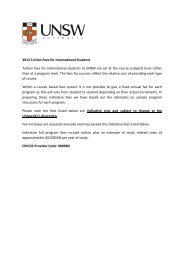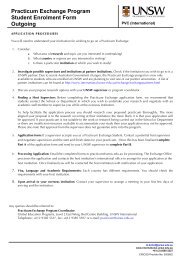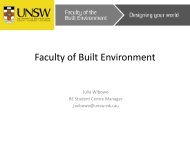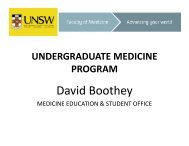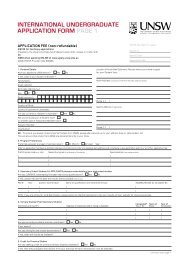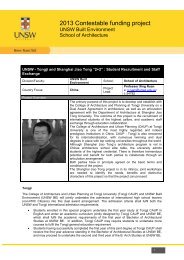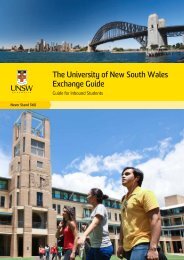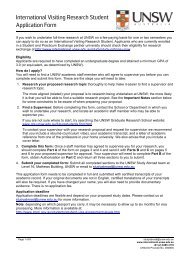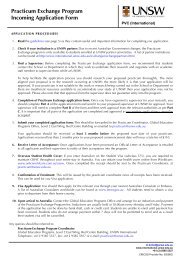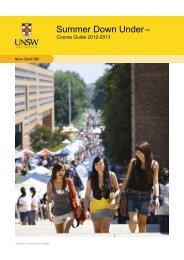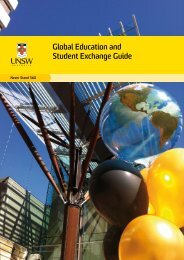undergraduate - UNSW International - The University of New South ...
undergraduate - UNSW International - The University of New South ...
undergraduate - UNSW International - The University of New South ...
You also want an ePaper? Increase the reach of your titles
YUMPU automatically turns print PDFs into web optimized ePapers that Google loves.
www.unsw.edu.au | <strong>UNSW</strong> <strong>International</strong> Undergraduate Guide 2011 | 37BusinessBachelor <strong>of</strong> CommerceProgram code 3502FacultyAustralian School <strong>of</strong> BusinessMin. years 3 yearsUOC (per year/total) 48/144Semester 2 entry YesEst. first year tuition A$28,080Est. fee to complete A$92,280Assumed Knowledge MathsOnline Handbook www.handbook.unsw.edu.au/<strong>undergraduate</strong>/programs/2010/3502.htmlWebsitewww.asb.unsw.edu.au<strong>The</strong> Bachelor <strong>of</strong> Commerce is a flexible businessdegree, which provides you with the opportunity tostudy up to two majors. You can tailor your degreeto your interests, design your degree with a specificcareer outcome in mind, e.g. actuarial studies,accounting, finance, human resource management,marketing or information systems. Alternatively, youcan design a degree with a broader business focuswith majors such as management, internationalbusiness or business economics.Core courses for the Bachelor <strong>of</strong> Commerce to becompleted in your first semester are: Accounting andFinancial Management 1A, Business and EconomicStatistics, Microeconomics 1, and ManagingOrganisations and People.In your second semester, you choose four coursesfrom the following list to help you decide which areasto major in: Accounting and Financial Management1B, Business and the Law, Business Finance, BusinessInformation Systems, Macroeconomics 1, MarketingFundamentals, and Actuarial Studies for Commerce(only for students considering Actuarial Studies as amajor).MajorsAccounting involves the analysis <strong>of</strong> information toeffectively manage business resources. It guidesinvestment decisions and facilitates interactionbetween business and stakeholders.Actuarial Studies involves financial and insurancerisk analysis and the application <strong>of</strong> risk modelsto long term financial management in areassuch as investment, finance, general insurance,superannuation and life insurance.Business Economics is a diverse and fascinatingdiscipline which analyses decision making byindividuals, business, government and globalorganisations.Business Law is available as a second major andfocuses on the legal requirements underpinningand regulating all forms <strong>of</strong> commercial activity. Itexplores the concept <strong>of</strong> business morality and theresponsibility <strong>of</strong> company directors and boards tomake ethical business decisions.Business Strategy and Economic Managementdeals with strategic behaviour among firms andprovides tools for effective business decision making.This major looks at important issues such as thebehaviour <strong>of</strong> individuals and firms and their strategicinteractions, and economic growth and development.Finance is the science <strong>of</strong> managing money ininternational and domestic financial markets. Itis concerned with investment decisions, valuingfinancial assets, managing funds and developingstrategies to minimise financial risk.Financial Economics looks to understand howindividuals, firms and markets manage financial risk.This major analyses decision making by individuals,business, government and global organisations.Human Resource Management is the strategicapproach to managing an organisation’s employees.It is based on the premise that the most progressivebusiness strategy can only be executed effectivelywhen staff are committed to the organisation’sobjectives.Information Systems use computers andcommunication networks to acquire, organiseand process information, enabling people andorganisations to be more creative and productive.Studying information systems involves learningto: understand the needs <strong>of</strong> individuals andorganisations; design and develop systems to meetthose needs; and implement and continually adaptthese systems to changing organisational needs.<strong>International</strong> Business is a rapidly growing fielddealing with the development, strategy andmanagement <strong>of</strong> multinational organisations. Itinvestigates how firms organise and conductoperations globally, and how the competitiveinternational environment shapes the economic,political and cultural context for business.Management looks at building and developingrelationships between people and organisations, aswell as formulating goals, designing organisationalstructures, fostering innovation and regulatingresources.Marketing is about communicating value toconsumers in order to develop and maintainrelationships with customers, clients, suppliers anddistributors. Understanding consumer needs anddesires is a key aspect <strong>of</strong> marketing, which usesmarket analysis and research to determine effectiveway to build pr<strong>of</strong>itable customer satisfaction.Modern Languages enable you to study a languageas a second major. Available are courses in ChineseStudies, French Studies, Japanese Studies andKorean Studies.Taxation provides the government with funding todeliver essential services and manage the economy.An awareness <strong>of</strong> taxation legislation and policiesenables companies and individuals to structuretheir business transactions in a tax effective manner,increasing pr<strong>of</strong>it and efficiency.Career OpportunitiesThis degree is a highly valued business qualificationthat opens the door to a wide variety <strong>of</strong> careers.It provides the specialist technical skills which arethe building blocks for a career in business, aswell as developing your analytic skills. Graduatesare qualified to pursue a range <strong>of</strong> careers acrosslocal and international organisations, governmentand not-for-pr<strong>of</strong>its. Examples include accountants,economists, strategy consultants, businessmanagers, marketing specialists, information systemsconsultants, taxation advisors, investment bankers,actuaries and policy advisors.Pr<strong>of</strong>essional RecognitionYou can tailor your studies to meet the educationalrequirements for peak pr<strong>of</strong>essional bodies includingthe Australian Computer Society (ACS), AustralianHuman Resource Institute (AHRI), Australian Marketand Social Research Society (AMSRS), AustralianSecurities and Investment Commission (ASIC), CPAAustralia, Financial Services Institute <strong>of</strong> Australasia(FINSIA), the Institute <strong>of</strong> Actuaries <strong>of</strong> Australia,the Institute <strong>of</strong> Chartered Accountants in Australia(ICAA).Bachelor <strong>of</strong> Commerce (Liberal Studies)Program code 3539FacultyAustralian School <strong>of</strong> BusinessMin. years 4 yearsUOC (per year/total) 48/192Semester 2 entry YesEst first year tuition A$28,080Est fee to complete A$126,640Assuned knowledge MathsOnline Handbook www.handbook.unsw.edu.au/<strong>undergraduate</strong>/programs/2010/3539.htmlWebsitewww.asb.unsw.edu.au<strong>The</strong> Bachelor <strong>of</strong> Commerce (Liberal Studies) is ahighly valued business qualification that opens thedoor to a wide variety <strong>of</strong> careers. By combiningrigorous business studies with a liberal studiescomponent, you are able to design a degree whichallows you to undertake studies in the areas <strong>of</strong>accounting, finance, human resource management,marketing, information systems, management,international business, business economics orbusiness law while at the same time following yourinterests through studies in Arts, Social Sciences,Languages, and/or Science.Core courses for the Bachelor <strong>of</strong> Commerce (LiberalStudies) to be completed in your first semester are:Accounting and Financial Management 1A, Businessand Economic Statistics, Microeconomics 1, andManaging Organisations and People.In your second semester, you choose four coursesfrom the following list to help you decide which areasto major in: Accounting and Financial Management1B, Business and the Law, Business Finance, BusinessInformation Systems, Macroeconomics 1, MarketingFundamentals, and Actuarial Studies for Commerce(only for students considering Actuarial Studies as amajor).MajorsOne or two majors can be chosen from the Bachelor<strong>of</strong> Commerce, plus a possible third major fromhumanities, social sciences, language or science.Career OpportunitiesThis degree provides graduates with specialist skillsin business, complemented by a liberal education.Graduates are qualified to pursue a range <strong>of</strong>careers across local and international organisations,government and not-for-pr<strong>of</strong>its.Pr<strong>of</strong>essional RecognitionYou can tailor your studies to meet the educationalrequirements for peak pr<strong>of</strong>essional bodies includingthe Australian Computer Society (ACS), AustralianHuman Resource Institute (AHRI), Australian Marketand Social Research Society (AMSRS), AustralianSecurities and Investment Commission (ASIC), CPAAustralia, Financial Services Institute <strong>of</strong> Australasia(FINSIA), the Institute <strong>of</strong> Actuaries <strong>of</strong> Australia,the Institute <strong>of</strong> Chartered Accountants in Australia(ICAA).NOTEEstimated first year tuition is based on 2010 tuition fees.Total program costs are an indicative figure only. Indicativefees have been calculated on a percentage increase forevery year <strong>of</strong> the program. Fee increases are assessedannually and may exceed the indicative figures listedabove.Estimated fees to complete include tuition plus anestimate <strong>of</strong> other study-related costs <strong>of</strong> approx A$1,000per year.



